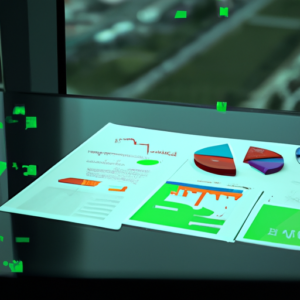Learning About CRM and ERP: A Comprehensive Guide
Table Of Contents
- Introduction
- What is CRM and ERP?
- Why are CRM and ERP important for businesses?
- How can CRM and ERP benefit your business?
- Understanding CRM
- What is CRM and how does it work?
- Different types of CRM systems
- Examples of popular CRM services, including Microsoft Dynamics 365 and Odoo CRM
- Benefits of using CRM for your business
- Understanding ERP
- What is ERP and how does it work?
- Different types of ERP systems
- Examples of popular ERP services, including Microsoft Dynamics 365 and Odoo ERP
- Benefits of using ERP for your business
- Differences between CRM and ERP
- Key differences between CRM and ERP systems
- How they complement each other in a business setting
- Implementing CRM and ERP
- Choosing the right CRM and ERP system for your business
- Best practices for implementing CRM and ERP systems
- Challenges to consider during implementation
- Case studies of successful CRM and ERP implementations
- Conclusion
- The importance of CRM and ERP for modern businesses
- Future developments and trends in CRM and ERP
- Final thoughts and recommendations
Introduction
 CRM (Customer Relationship Management) and ERP (Enterprise Resource Planning) are two pivotal business software solutions that help organizations manage various facets of their operations. Though distinct, they often interlink to give a holistic view of business processes. In this guide, we explore the nuts and bolts of CRM and ERP, highlighting the benefits and humorously poking fun at the potential drawbacks of using systems like Microsoft Dynamics 365 and Odoo CRM.
CRM (Customer Relationship Management) and ERP (Enterprise Resource Planning) are two pivotal business software solutions that help organizations manage various facets of their operations. Though distinct, they often interlink to give a holistic view of business processes. In this guide, we explore the nuts and bolts of CRM and ERP, highlighting the benefits and humorously poking fun at the potential drawbacks of using systems like Microsoft Dynamics 365 and Odoo CRM.
What is CRM?
CRM Explained
CRM software is tasked with managing customer interactions and unlocking insights into customer behavior. It’s where organizations keep tabs on their customer relationships encompassing sales, marketing, and customer service. Data like contact details, purchase history, and social media activity is hoarded to glean customer preferences and behavior.
Example in Focus: Microsoft Dynamics 365
Microsoft Dynamics 365 serves as a full-scale observatory on customer interactions aiding in better understanding of customer needs. While it’s rich with features like sales automation and customer service management, it could also charm you into a false sense of data omnipotence — yes, you can know too much about your customers!
What is ERP?
ERP Unpacked
ERP software juggles various business processes from finance to procurement. It merges disparate business operations into a single unified system, offering a bird’s eye view of business processes. Odoo CRM, doubling as an ERP system, showcases functionalities ranging from accounting to human resources.
Odoo CRM: A Double Agent
Odoo CRM not only manages customer interactions but also serves up features for comprehensive business management. However, be warned, it might just make you feel like you’re running a mini-empire, which could be as overwhelming as it is exhilarating.
Benefits of CRM and ERP
Both systems promise a world of operational efficiency and improved decision-making through unified data views and automation. Microsoft Dynamics 365 and Odoo CRM stand out with their capabilities but beware, they might just spoil you with efficiency, making old school spreadsheets feel like ancient tools!
Understanding CRM

CRM systems, in all their glory, manage everything from marketing to customer service. The types vary:
- Operational CRM: Automates mundane tasks, freeing up time (just don’t let it make you too lazy).
- Analytical CRM: Dives deep into data for insights (perfect for when you feel like playing detective).
- Collaborative CRM: Fosters team communication (because sometimes, more heads are better than one).
Benefits and Drawbacks
CRMs like Microsoft Dynamics 365 and Odoo CRM can dramatically enhance customer relations and operational efficiency. However, be prepared for the occasional over-reliance on technology — remember, it still can’t replace a good old-fashioned handshake!
You can read more on Dynamics 365 and Odoo CRM here:
Microsoft 365 Dynamics: A brief Introduction
Understanding ERP
Types of ERP Systems
- On-premise: Total control but prepare for a hefty upfront cost.
- Cloud-based: Convenient yet at the mercy of internet whims.
- Hybrid: Best of both worlds, or double the trouble?
Why Choose ERP?
The allure of streamlined operations and consolidated data is strong with ERP systems like SAP and Oracle. Yet, they could have you miss the messiness of manual processes (oddly satisfying, isn’t it?).
Implementing CRM and ERP

Choosing the Right CRM and ERP System for Your Business
Selecting the right system is no small feat. Consider your business size, process complexity, and, of course, your budget. Don’t forget to ponder on integration capabilities and ease of use unless you enjoy tech-induced headaches.
Best Practices for Implementing CRM and ERP Systems
Challenges to Anticipate
- Resistance to Change: Who doesn’t love a bit of drama with system overhauls?
- Data Migration: Moving data can be as fun as a root canal, but it’s essential for success.
Case Studies to Learn From
Microsoft Dynamics 365 at Yaskawa America: Improved customer service with a dash of existential questioning on automation reliance. Odoo CRM at MHI: Streamlined sales with occasional ‘where’s that feature again?’ moments.
Conclusion
CRM and ERP systems, like Microsoft Dynamics 365 and Odoo CRM, are vital for businesses aiming to harness efficiency and data-driven decision-making. They promise a future where operations are smooth, and insights flow freely — just remember, even the most advanced systems need a human touch. As we continue to lean on technology, these systems will only grow more integral to business success. Embrace them, quirks and all, and watch your business thrive.




